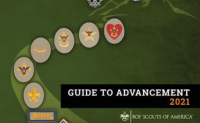Have you ever studied the characteristics of high-performance teams? In Wood Badge, and in many corporate teambuilding programs, you’ve learned about how groups of people interact. Most likely you remember the terms Forming, Storming, Norming and Performing, and when you hear those words you probably even visualize the four-square diagram sometimes used to illustrate the process. Well, in order to become a performing team, you need to get past the forming and storming to reach a phase of norming.
What is norming? It really means putting everyone on the same page and following the same set of rules, guidelines, or expectations. In the corporate world this is often called “establishing team norms”. Simply put, it’s a set of rules that everyone uses to guide their behavior in the group. Even our Scouts go through this, particularly within patrols (and most of them go through a lot of storming!). The noted management consultant and author Ken Blanchard, whose concepts are found in the 21st Century Wood Badge course, offered the analogy that a river without banks is just a pond. Likewise, a group without relationship norms is likely to suffer from interpersonal problems and be discouraged from all flowing in the same direction.
Here are some sample relationship guidelines, or “team norms”. How many of these can you apply to your committee?
- Treat each other with dignity and respect. Be open-minded; don’t be defensive with your colleagues. Support each other – don’t throw each other under the bus.
- Avoid hidden agendas.
- Trust each other. Be confident that issues discussed in confidence will be kept that way, and that the others have the same commitment to Scouting’s values and mission as you do.
- The committee is an open space where people have information and are free to ask for what they need. To make this possible, members should consistently practice a commitment to share all the information they have, up front.
- Listen first to understand. Don’t be dismissive of the input received. Listen to the words being said regardless of who is saying them.
- Have a clean-slate process. Give your fellow committee members the benefit of the doubt, rather than searching for the guilty. Practice open-mindedness.
- It’s okay to not know the right answer and to admit it. Use the power of the committee to find the answer.
- Avoid being territorial; work toward the overall good of the group. Recognize that you are part of something larger than yourself, and be responsible for the whole implementation of the outcome, not just your little piece.
- If you commit to do something, do it. Be accountable and responsible. Come prepared to meetings so that you demonstrate respect for and value the time and convenience of others.
- Apply the twelve points of the Scout Law to your actions.
By putting the welfare of the committee first, you can accomplish the goals and objectives of the committee, which is to support a better Scouting experience for the boys.
Next: Problem characters and what to do about them
Previous articles in this series:
- Effective committee meetings: Introduction
- Effective committee meetings: The purpose of meetings
- Planning committee meetings
- Agenda planning
- Time for the meeting!
- Parliamentary procedures
This post first appeared on Bobwhite Blather.




